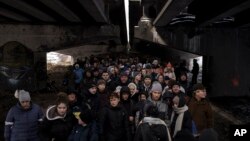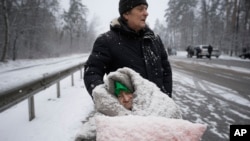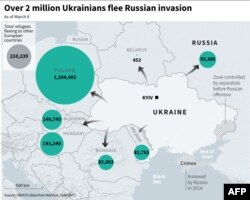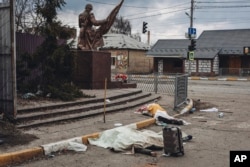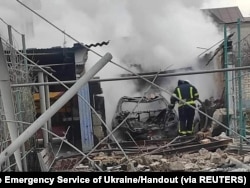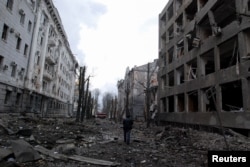Civilians in some parts of Ukraine besieged by Russian forces were able to evacuate Tuesday, fleeing in buses or on foot amid temporary cease-fires.
In one instance, people were leaving the eastern city of Sumy, where hours earlier a Russian airstrike on a residential street killed at least 21 civilians, according to local authorities.
People were also seen departing the town of Irpin, near the Ukrainian capital, Kyiv.
Russia’s Defense Ministry said additional evacuation corridors would be in place in Chernihiv, Kharkiv and Mariupol.
Several previous attempts to set up a way for people to get out of areas that have been subjected to Russian attacks during the nearly 2-week-old Russian invasion of Ukraine fell apart, including one for those in Mariupol, the target of renewed shelling, according to reports.
Ukrainian Foreign Minister Dmytro Kuleba on Tuesday accused Russia of holding 300,000 people “hostage in Mariupol,” a city of about 430,000, and preventing humanitarian evacuations.
“I urge all states to publicly demand: RUSSIA, LET PEOPLE GO!” Kuleba tweeted.
Red Cross buses carrying water, medicine and food Tuesday surrounded the southern part of Mariupol. Shortly after Ukrainian officials announced the buses were approaching the city, however, the officials said they had been made aware of shelling along the escape route.
It was not clear if the supply convoy arrived at Mariupol, and it seemed unlikely that civilians would be able to board the buses for evacuation, as stated by Ukrainian Deputy Prime Minister Iryna Vereshchuk.
The United Nations’ refugee agency said Tuesday that more than 2 million people have fled Ukrainian cities as Russian forces cut off food, water, heat and medicine, sparking Europe's worst refugee crisis since World War II. More than half have gone to Poland.
NATO Secretary-General Jens Stoltenberg described the civilian impact in Ukraine as “devastating” and called for “real humanitarian corridors that are fully respected.”
“There are very credible reports of civilians coming under fire as they try to evacuate,” he said Tuesday. “Targeting civilians is a war crime, and it’s totally unacceptable.”
U.S. Secretary of State Antony Blinken called on Russia to allow humanitarian access for civilians in Ukraine and said Ukraine's allies will do "everything we can" to ensure Ukrainians have what they need to defend themselves.
"This is (Russian) President (Vladimir) Putin's war to subjugate a sovereign, democratic country. And until he ends it, the world will hold him accountable," he said during a joint news conference Tuesday with Estonian Prime Minister Kaja Kallas in Tallinn.
Kallas said the conflict demands “our continued and united support for Ukraine,” including military and humanitarian support, and closing loopholes in sanctions against Russia.
“We will keep finding new tools in our toolbox until Putin’s war machine has been neutralized,” she said.
A day after U.S. President Joe Biden and the leaders of France, Germany and Britain pledged on a video call Monday to continue to hold Russia accountable for its invasion of Ukraine, Biden announced a ban on U.S. imports of Russian oil and gas.
Britain also announced Tuesday it would ban imports of Russian oil, saying they will be phased out by year’s end.
Hours before the bans were announced, Blinken said there is ongoing work to ensure a steady global supply of energy from other sources.
"There is a significant, not only opportunity, but imperative in this moment to finally move off a dependence on Russian energy, because Russia uses it as a weapon," he said.
Blinken was heading to Paris for talks Tuesday with French President Emmanuel Macron, who has spoken in recent days with both Putin and Ukrainian President Volodymyr Zelenskyy.
Russian attacks overnight included bombings of cities in eastern and southern Ukraine and shelling that hit several suburbs of Kyiv.
Britain’s Defense Ministry said Ukrainian forces are resisting Russia’s advance toward Kyiv with pressure in towns outside the capital city.
British Defense Secretary Ben Wallace said Tuesday such resistance and supply problems are making Russian forces more desperate. He said as a result, Russia is conducting “indiscriminate shelling” of civilians.
Leaders of U.S. government intelligence agencies also said Putin is likely to intensify attacks on Ukraine, despite Russia’s military setbacks and growing economic woes stemming from global sanctions.
"Our analysts assess that Putin is unlikely to be deterred by such setbacks and instead may escalate," Director of National Intelligence Avril Haines said at Tuesday’s annual House of Representatives Intelligence Committee hearing on worldwide threats.
Haines also warned of the possibility of "unintended escalation" as international tensions escalate.
U.S. Central Intelligence Agency Director William Burns told the lawmakers he believes “Putin is angry and frustrated” and “likely to double down and try to grind down the Ukrainian military with no regard for civilian casualties."
Kuleba and Russian Foreign Minister Sergey Lavrov were due to meet Thursday in Turkey to discuss the situation. Kuleba said he will propose a direct meeting between Zelenskyy and Putin.
“We want talks between the president of Ukraine and Vladimir Putin since he is the one who makes the final decisions,” Kuleba said on Ukrainian television.
A series of lower-level talks between the two sides yielded no major breakthroughs in resolving the conflict.
VOA chief national correspondent Steve Herman, national security correspondent Jeff Seldin, Pentagon correspondent Carla Babb, Istanbul foreign correspondent Heather Murdock, White House correspondent Anita Powell, and senior diplomatic correspondent Cindy Saine contributed to this report. Some information also came from The Associated Press, Agence France-Presse, and Reuters.




